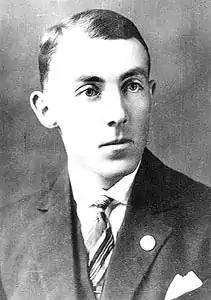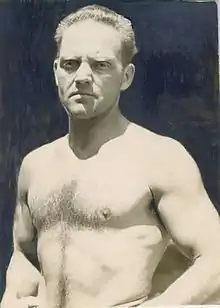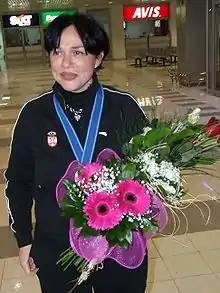
The Yugoslav Olympic medalists are athletes who competed and won medals for various Yugoslav entities at the Summer and Winter Olympic games between 1920 and 2002.[1][2] While being part of Yugoslavia, athletes represented three distinct national entities; the Kingdom of Yugoslavia (1920–1936), and the Socialist Federal Republic of Yugoslavia (1948–1988) and the FR Yugoslavia (1994–2002). Yugoslavia was a multinational state with six constitutive ethnic groups; Muslims (e.g. Bosniaks)[A], Croatians, Macedonians, Montenegrins, Serbs and Slovenes, and significant ethnic minorities in Vojvodina (Hungarians) and Kosovo (Albanians).[3] Before the formation of the Kingdom of Yugoslavia in 1918, athletes from the region mostly represented Austria or Hungary, with the sole exception being the 1912 Summer Olympics when a small team of two athletes competed for the Kingdom of Serbia.[2]
Because of the breakup of Yugoslavia in 1991 and 1992, Olympic participation changed. Newly independent Croatia and Slovenia sent their own delegations to the 1992 Winter Olympics, with Yugoslavia represented by athletes from Bosnia and Herzegovina, Macedonia, Montenegro and Serbia.[4]
The Federal Republic of Yugoslavia was established in April 1992, consisting of the Republic of Montenegro and the Republic of Serbia. However, United Nations Security Council Resolution 757 (adopted May 30, 1992)[5] called upon states to:
Take the necessary steps to prevent the participation in sporting events on their territory of persons or groups representing the Federal Republic of Yugoslavia (Serbia and Montenegro);
— Paragraph 8(b)
Despite this, the International Olympic Committee decided unanimously that athletes from Serbia and Montenegro (and also Macedonia) could compete in the 1992 Summer Olympics in Barcelona. The conditions imposed were that the athletes would compete as Independent Olympic Participants (IOP), wear white clothing without distinctive signs, and use the Olympic Anthem and Olympic flag in victory ceremonies.[6] The athletes could not participate at the opening and closing ceremonies of the games.
A team of 52 athletes competed in individual events, with three medals won in shooting. The restriction for individual athletes meant that the men's water polo team, the women's basketball team, and the men's and women's handball teams could not compete, despite having qualified for the Games.[7]
Athletes, who has represented Yugoslavia, has won a total of 52 individual Olympic medals (16 gold, 16 silver and 20 bronze) between 1920 and 1988. The majority were won at the Summer Olympics, with only three medals (two silver and one bronze) won at the Winter Olympics. Leon Štukelj has won the most individual Olympic medals with three gold, one silver and one bronze in gymnastics. He was also part of the bronze medal winning men's gymnastics team during the 1928 Summer Olympics, making him the most successful Yugoslav athlete in history. Gymnast Miroslav Cerar is the only other athlete with more than one individual gold medal, having won a total of two gold and one bronze medals. Jasna Šekarić is the most successful female Yugoslav athlete with one gold, two silver and one bronze medals in shooting, followed by Đurđica Bjedov, Aleksandra Ivošev and Mateja Svet .
In team events, Yugoslavia has won a total of 35 Olympic medals (10 gold, 16 silver and nine bronze). The most successful team was the men's water polo team, with a combined total of seven medals (three gold and four silver). Similarly successful were the men's handball team (two gold, one bronze) and the men's football and basketball teams with five medals each (one gold, three silver and one bronze). Women's teams shared similar success with the women's handball team winning one gold and one silver and the women's basketball team with one silver and one bronze medals. The only Yugoslav team with a medal from the Winter Olympics was the men's ski jumping team that won silver at the 1988 Winter Olympics.
Olympic medalists
The ranking in the tables below are based on information provided by the International Olympic Committee (IOC) and is consistent with IOC convention in its published medal tables.
Individual

.jpg.webp)

| ♀ | Female athlete |
| § | Part of the Winter Olympics |
Medals per region
The table shows the number of individual Yugoslav Olympic medals, won per region. Regions used are the Republics that were in use since 1944. All six Socialist Republics have since become fully independent nations and are members of the International Olympic Committee (IOC). The table uses place of birth of the athletes to determine the number of medals per region and not their nationality or ethnic group.
| Rank | Region | Most successful sport (number of medals) |
Gold | Silver | Bronze | Totals |
|---|---|---|---|---|---|---|
| 1 | 5 | 7 | 11 | 22 | ||
| 2 | 5 | 4 | 4 | 13 | ||
| 3 | 4 | 4 | 3 | 11 | ||
| 4 | 2 | 1 | 1 | 4 | ||
| 5 | 1 | 2 | 3 | 6 | ||
| 6 | — | — | — | — | — | |
Team

| § | Part of the Winter Olympics |
| Rank | Name | Sport | Gold | Silver | Bronze | Totals |
|---|---|---|---|---|---|---|
| 1 | 3 | 4 | 1 | 8 | ||
| 2 | 2 | 0 | 1 | 3 | ||
| 3 | 1 | 4 | 1 | 6 | ||
| 4 | 1 | 3 | 1 | 5 | ||
| 4 | 1 | 1 | 0 | 2 | ||
| 5 | 1 | 0 | 1 | 2 | ||
| 6 | 1 | 0 | 0 | 1 | ||
| 6 | 1 | 0 | 0 | 1 | ||
| 7 | 0 | 1 | 1 | 2 | ||
| 7 | 0 | 1 | 1 | 2 | ||
| 8 | 0 | 1 | 0 | 1 | ||
| 8 | 0 | 1 | 0 | 1 | ||
| 8 | 0 | 1 | 0 | 1 | ||
| 9 | 0 | 0 | 1 | 1 | ||
| 9 | 0 | 0 | 1 | 1 | ||
| 9 | 0 | 0 | 1 | 1 | ||
| 9 | 0 | 0 | 1 | 1 | ||
Footnotes
- ^ Muslims was a term used for one of the constitutive nations in the Socialist Federal Republic of Yugoslavia as an official ethnic designation of nationality of Slavic Muslims and thus encompassed a number of populations ethnically distinct, including the Bosniaks, and to a minor extent Gorani, Pomaks and Macedonian Muslims.[3]
- ^ Leon Štukelj, Josip Primožič and Stane Derganc were all part of the Yugoslav men's gymnastics team during the 1928 Summer Olympics, which won a bronze medal. Combined with individual medals Štukelj's total medal tally includes three gold, one silver and two bronze, Primožič's one silver and one bronze and Dergenc's two bronze.
- ^ Jasna Šekarić, Aranka Binder and Stevan Pletikosić won medals as Independent Olympic Participants at the 1992 Summer Olympics.
- ^ Matija Ljubek was part of the gold medal winning Men's C-2 500 metres double and the silver medal winning Men's C-2 1000 metres double, at the 1984 Summer Olympics. Both times he was paired with Mirko Nišović. Combined with individual medals his total Olympic medals tally includes two gold, one silver and one bronze.
- ^ Matjaž Debelak was part of the silver medal winning men's team on the Ski Jumping large hill event, at the 1988 Winter Olympics. Combined with his individual medal his total Olympic medals tally includes one silver and one bronze.
- ^ Athletes from Slovenia have won all Yugoslav medals (individual) in gymnastics, for an Olympic tally of five gold, two silver and three bronze. In addition, all members of the bronze medal winning men's gymnastics team during the 1928 Summer Olympics were from Slovenia, except Dragutin Ciotti who was born in Rijeka, present day Croatia.
- ^ Athletes from Slovenia have won all Yugoslav medals at the Winter Olympics (individually and as a team), for an Olympic tally of three silver medals and one bronze.
- ^
- ^
See also
References
- General
- "All the medallists since 1896". International Olympic Committee. Retrieved 14 October 2013.
- Specific
- ↑ "Yugoslavia at the Olympics". International Olympic Committee. Retrieved 3 August 2019.
- 1 2 "Yugoslavia at the Olympics". topendsports.com. Retrieved 3 November 2015.
- 1 2 "Ethnic Groups in the Former Yugoslavia" (PDF). historoda.com. Retrieved 3 November 2015.
- ↑ "Yugoslavia - 1992". Olympic Committee of Serbia. Retrieved 2008-08-13.
- ↑ "United Nations Security Council Resolution 757 (Implementing Trade Embargo on Yugoslavia)". University of Minnesota Human Rights Center. Retrieved 2008-08-18.
- ↑ "Decisions of the 99th Session" (PDF). Olympic Review. International Olympic Committee (299): 415–416. September 1992. Retrieved 2008-08-14.
- ↑ "Games of the XXV Olympiad - Barcelona 1992". Olympic Committee of Serbia. Retrieved 2008-08-14.